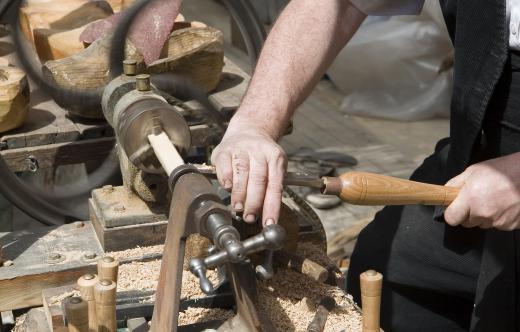A lathe center mounts in the tail stock of a lathe and is used to hold a work piece steady. The typical lathe center is made of hardened tool steel and comes to a fine point. The point is driven into the center of a work piece, which can rotate between the lathe center and lathe chuck. This provides a sturdy and secure mounting device for the lathe.
When not utilizing the lathe center, a work piece tends to wobble and will often come out of the chuck. This creates a work place hazard as it could fly across the work area. The work piece is also difficult to cut and shape properly due to its tendency to wobble as pressure is placed against it.

The lathe center is not only used on large pieces. It is used on very small objects as well when the need for fine and accurate detail calls for a steady work piece. The lathe center is used on the small piece until the final stages where it is removed to allow for the final detailing. This especially holds true when knurling an item's surface.
There are two basic types of lathe centers: A live and a dead center. The live lathe center consists of a pointed tool that rotates and spins on a bearing. This type of center allows the piece to be held tightly and turned quickly without burning or damaging the work. The dead center is is a point that is locked into position and the work piece spins on the point while the point is motionless. This can burn the piece and often works itself loose.
A screw center is used in the creation of bowls. The center has a wood screw located in the center of the point and the work piece is tightened against it with the screw. Once the bowl has been turned, it is removed from the screw and set aside. This type of lathe center is best for an item that may be removed and reinstalled many times as it keeps the work centered and in place on the center.
A spur center uses sharp blades surrounding a pointed tip. The tip sinks into the work piece while the blades cut into it and provide a driving mechanism. The harder the piece is turned, the harder the spur center digs into the wood keeping it in the proper location. A metal lather does not typically utilize a spur center.
